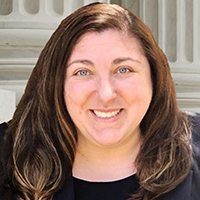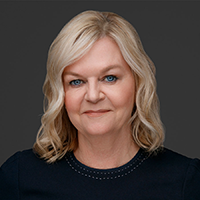
Tips from the Bench: Judge Lorna Alksne

Attorney at Law
You may recognize Judge Lorna Alksne from your living room. Or, possibly, your patio.
During the COVID-19 pandemic, the recently retired Presiding Judge of San Diego Superior Court made numerous virtual appearances into the homes of local lawyers, court staff, advocates, and law students to guide them through the challenging time.
“I did those Zooms and sometimes there were 2,000 people on them,” she says. “I was in their kitchen.”
Judge Alksne was able to mobilize the online effort so quickly because when she became Presiding Judge in 2019, her goal was to create virtual courthouses to ease the stresses and costs of appearing in court. Her passion stems from her own struggles juggling law and life. When she was a student at the University of San Diego School of Law, she created her course schedule around her access to daycare. She notes that when she presided in Vista for four years, she wasn’t exempt from traffic.
“In the summer, with the fair and baseball season, it can be two hours in the afternoon to go home or to come back to downtown from Vista,” she recalls.
Her virtual courthouse plan prior to the pandemic was going to start with just the probate and unlawful detainer departments, because those courtrooms are exclusively downtown, but then plans changed.
“We were talking about how great that is going to be, and then it happened with COVID,” she says. “Now every court can be remote.”
While she hasn’t been in a courtroom since she retired earlier this year, she hopes virtual court is here to stay.
“The fact is that we all had this capacity on our computers for free,” she said. “I think some people like to do everything the way it’s always been done because that’s what they’re comfortable with, but I don’t think there’s any putting the genie back in the bottle.”

From Pro Tem to Presiding Judge
Judge Alksne originally joined San Diego Superior Court in 2000 as a Juvenile Court pro tem judge and then served as a court commissioner handling traffic and small claims matters before being appointed to the bench in 2005. She served as Assistant Presiding Judge from 2018 to 2019, after which she assumed the role of Presiding Judge for the remainder of her time with the Court.
During her years on the bench, Judge Alksne served on several Judicial Council committees, including the Futures Commission, the Family-Juvenile Advisory Committee, the Elkins Task Force, and the Elkins Implementation Committee. For 13 years, she chaired the Judicial Branch Workload Assessment Advisory Committee to the Judicial Council. She also has held faculty member positions with the Center for Judicial Education and Research and the National Institute of Family Law Trial Advocacy.
Judge Alksne was recently honored by the San Diego Chapter of the American Board of Trial Advocates in honor of her service during her term as Presiding Judge. Her other accolades include Distinguished Judge of the Year by the Academy of Matrimonial Lawyers and Judge of the Year by the San Diego Certified Family Law Specialists in 2009.
Since retiring in February, Judge Alksne has joined JAMS, which she describes as a slower paced but very satisfying role. She will focus on six practice areas at JAMS: business and commercial, employment law, family law, personal injury/torts, professional liability, and real estate and Real Property. That may sound like a lot, but as a judge, she has presided in the Traffic, Small Claims, Unlawful Detainer, Criminal, Civil, Juvenile, Family, and Dependency departments. The only department she did not work in, and which in hindsight she wishes she could have experienced, was Probate.
“My favorite place to be is in the courtroom, and I don’t really care what kind of case it is,” she said. “I did all of them, and I loved all of them.”
The Three P’s To A Successful Practice
Judge Alksne has three tips she likes to give to new attorneys, two of which were passed down to her from the judge whom she clerked for as a law student. She explained, “Judge Lee Mason, who’s since passed away, was all about being professional and being prepared, but the participation pointer is mine.”
Professionalism
Being professional is not just about what you say, but about knowing when to not say anything.
“You are going to lose a case,” she foretells, “and you’re going to lose a case that you should have won, and when you do, do it gracefully. Take the case back to the office, think about it, and if you can appeal it because it’s an appealable issue, do that and get your result that way. But rolling your eyes, smacking your hand down on the desk, sending inappropriate emails to an opposing counsel that mention the judge, ‘This judge is such a stupid idiot, they got it all wrong, I’m going to appeal that case.’ Guess what? That’s going to be Exhibit 1.”
Preparation
Preparation requires much more than just getting to court on time — it’s anticipating everything that could go wrong and having a solution for it. For example, if you can’t get to court on time, then being prepared is knowing how the judge wants you to communicate that you are going to be late and having either the clerk’s phone number or email at the ready. Preparation also extends to your lawyering skills.
“Being prepared means you know the case, and you know the case cites,” she warns. “If you’re arguing a law and motion case and you’ve cited a case and you can’t explain how that case works in your favor, you don’t know that case — you simply string cited it, copied and pasted it, or took it out of Rutter. You need to know how that case applies to your facts so you can argue it, and if there’s a case that is opposed to your facts, you want to be able to distinguish it.”
Participation
Any opportunity time to meet another lawyer or a judge, whether you are volunteering for a nonprofit, attending a bar event, or judging a mock trial competition, you are creating opportunities to create a good reputation for yourself in the legal community.
“The networking, professionalism, being prepared, and then topping it off with participation is how you can have a good legal career in San Diego.”